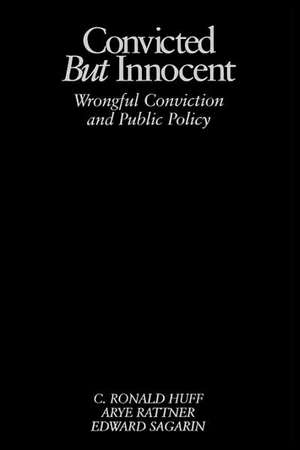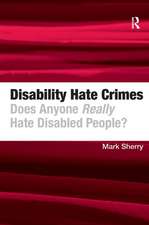Convicted but Innocent: Wrongful Conviction and Public Policy
Autor C. Ronald Huff, Arye Rattner, Edward Sagarinen Limba Engleză Paperback – 10 mar 1996
Preț: 548.59 lei
Preț vechi: 645.40 lei
-15% Nou
Puncte Express: 823
Preț estimativ în valută:
105.06€ • 108.25$ • 88.01£
105.06€ • 108.25$ • 88.01£
Carte tipărită la comandă
Livrare economică 24 februarie-10 martie
Preluare comenzi: 021 569.72.76
Specificații
ISBN-13: 9780803959538
ISBN-10: 0803959532
Pagini: 204
Dimensiuni: 158 x 230 x 15 mm
Greutate: 0.33 kg
Ediția:New.
Editura: SAGE Publications
Colecția Sage Publications, Inc
Locul publicării:Thousand Oaks, United States
ISBN-10: 0803959532
Pagini: 204
Dimensiuni: 158 x 230 x 15 mm
Greutate: 0.33 kg
Ediția:New.
Editura: SAGE Publications
Colecția Sage Publications, Inc
Locul publicării:Thousand Oaks, United States
Cuprins
Foreword - Simon Dinitz
Introduction
With Apologies to the Prisoner
Causes Célèbres
How Could This Have Happened?
The Causes and Prevalence of Wrongful Conviction
What Did They Really See?
The Problems of Eyewitness Identification
False Confessions, <i>Miranda</i> Notwithstanding
Wrongful Conviction and Public Policy
What Can Be Done?
Introduction
With Apologies to the Prisoner
Causes Célèbres
How Could This Have Happened?
The Causes and Prevalence of Wrongful Conviction
What Did They Really See?
The Problems of Eyewitness Identification
False Confessions, <i>Miranda</i> Notwithstanding
Wrongful Conviction and Public Policy
What Can Be Done?
Descriere
Addressing the specific issues surrounding wrongful convictions and their implications for society, Convicted but Innocent includes: survey data concerning the possible magnitude of the problem and its causes; fascinating actual case samples; detailed analyses of the major factors associated with wrongful conviction; discussion of public policy implications; and recommendations for reducing the occurrence of such convictions. The authors maintain that while no system of justice can be perfect, a focus on preventable errors can substantially reduce the number of current conviction injustices.













